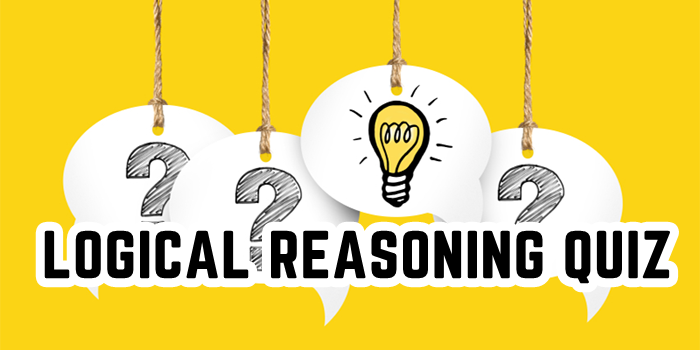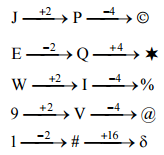Hello and welcome to ExamPundit. Here is a set of Reasoning Quiz for IBPS Clerk Prelims 2015.
Directions
(Q. 1-5): Study the following arrangement of numbers, letters and symbols carefully
and answer the questions given
below:
(Q. 1-5): Study the following arrangement of numbers, letters and symbols carefully
and answer the questions given
below:
R @ 2 9 T V A Y 5 © # J 1 P 8 Q $ E 3 ★ H % 6 W 4
I d U Z
I d U Z
1. Four of
the following five are alike in a certain way based on their positions in the
above arrangement and so
form a group. Which is the one That does not belong to that group?
the following five are alike in a certain way based on their positions in the
above arrangement and so
form a group. Which is the one That does not belong to that group?
1) J P ©
2) E Q ★
3) W I %
4) 9 V @
5) 1 # 5
2. Which
of the following is the fifth to the right of the nineteenth element from the
right end?
of the following is the fifth to the right of the nineteenth element from the
right end?
1) J 2) V 3) W 4) 8 5) None of these
| Solutions – 5th to the right of the 19th element from the right end means (19 – 5 =) 14th from the light end, ie, Q. |
|---|
3. How
many such numbers are there in the above arrangement, each of which is
immediately preceded by a
consonant and immediately followed by a symbol ?
many such numbers are there in the above arrangement, each of which is
immediately preceded by a
consonant and immediately followed by a symbol ?
1) One 2) Two 3) Three 4) Four 5) More than four
| Solutions – We have to look for consonant-number-symbol combination. There is only one such combination, which is y 5 ©. |
|---|
4. If the
positions of the last eighteen elements in the above arrangement are reversed,
which of the following will be the
seventeenth from the left end ?
positions of the last eighteen elements in the above arrangement are reversed,
which of the following will be the
seventeenth from the left end ?
1) H 2) P 3) W 4) 6 5) None of these
| Solutions – There are 29 elements in all in the given arrangement. If the positions of the last 18 elements are reversed, then the positions of the first 11 elements from the left end would be not changed, Now, 17 – 11 = 6, ie required answer would be the 6th element from the right in original sequence. 6th from the right end = W |
|---|
5. How
many such vowels are there in the above arrangement, each of which is either immediately followed by a symbol or immediately
preceded by a symbol ?
many such vowels are there in the above arrangement, each of which is either immediately followed by a symbol or immediately
preceded by a symbol ?
1) None 2) One 3) Two 4) Three 5) Four
| Solutions – We have to look for vowel-symbol and symbol-vowel conbinations. Such conbinations are $ E and Id. |
|---|
Directions
(Q. 6-10): In the following questions, the symbols ©, d, $, ★ and % are
used with the following meaning as
illustrated below:
(Q. 6-10): In the following questions, the symbols ©, d, $, ★ and % are
used with the following meaning as
illustrated below:
(i) ‘A d B’ means
‘A is not greater than B’
‘A is not greater than B’
(ii) ‘A% B’ means ‘A is not smaller than B’.
(iii) ‘A © B’ means ‘A is neither greater than nor smaller than
B’.
B’.
(iv) ‘A $ B’ means ‘A is greater than B’.
(v) ‘A ★ B’ means ‘A is smaller than B’.
Now in
each of the following questions assuming the given statements to be true, find
which of the two conclusions
I and II given below them is/are definitely true ?
each of the following questions assuming the given statements to be true, find
which of the two conclusions
I and II given below them is/are definitely true ?
Give answer (1) if only Conclusion I is true.
Give answer (2) if only Conclusion II is true.
Give answer (3) if either Conclusion I or II is true.
Give answer (4) if neither Conclusion I nor II is true.
Give answer (5) if both Conclusions I and II are true.
6. Statements: R $ J, J
% M, M © K
% M, M © K
Conclusions:
I.K © J II.K ★ J
I.K © J II.K ★ J
| Solutions – R > J.. (i); J ≥ M… (ii) M = K … (iii) Combining (ii) and (iii), we get J ≥ M = K ⇒ J ≥ K. Conclusions I and II together are exhaustive. Hence, either I or II is true |
|---|
7. Statements: D d R, M $ R, M © F
Conclusions:
I.F $ D II.F $ R
I.F $ D II.F $ R
| Solutions – D ≤ R… (i); M > R…(ii); M = F… (iii) Combining all, we get, D ≤ R < M = F ⇒ D < F ⇒ F > D. Hence conclusion I is true. Again, from (ii) and (iii), we get R < M = F ⇒ R < F ⇒ F > R. Therefore conclusion II is also true. |
|---|
8. Statements: H © F, F
$ R, R ★ K
$ R, R ★ K
Conclusions:
I.R ★ H II.K $ F
I.R ★ H II.K $ F
| Solutions – H = F … (i); F > R … (ii); R < K … (iii) From (i) and (ii), H = F > R ⇒ R < H. Hence conclusion I is true. Again, form (ii) and (iii), F > R < K ⇒ No relationship between K and F can be determined. Therefore conclusion II is not true. |
|---|
9. Statements: B % D, D ★ T, T d R
Conclusions:
I.B $ T II.R $ D
I.B $ T II.R $ D
| Solutions – B ≥ D… (i); D < T … (ii); T ≤ R… (iii) From (i) and (ii), B ≥ D < T ⇒ No relationship between B and T can be determined. Therefore conclusion I is not true. From (ii) and (iii), D < T ≤ R ⇒ D < R ⇒ R > D. Hence conclusion II is true. |
|---|
10. Statements: M % N,
N ★ A, A $ B
N ★ A, A $ B
Conclusions:
I.B ★ N II.A $ M
I.B ★ N II.A $ M
| Solutions – M ≥ N… (i); N < A… (ii); A > B …(iii) From (ii) and (iii), N < A > B ⇒ No relationship between N and B can be determined. Hence conclusion I is not true. Again, from (i) and (ii), M ≥ N < A.⇒No relationship between M and A can be determined. Therefore conclusion II is also not true. |
|---|
Regards
function answer(id){
if(document.getElementById(id).style.display == “block”){
document.getElementById(id).style.display = “none”;
}else{
document.getElementById(id).style.display = “block”;
}
}
#a1{display:none;}
#a2{display:none;}
#a3{display:none;}
#a4{display:none;}
#a5{display:none;}
#a6{display:none;}
#a7{display:none;}
#a8{display:none;}
#a9{display:none;}
#a10{display:none;}
Team ExamPundit
Sponsored
(adsbygoogle = window.adsbygoogle || []).push({});
Books For 2015 Banking/Insurance Exams





